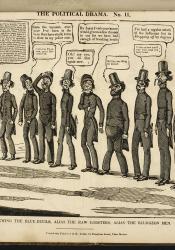Creation Of The Unified Metropolitan Police Force
The Unified Metropolitan Police Force was created in 1829 because of the passing of Sir Robert Peel’s Metropolitan Police Act in 1829. The Metropolitan Police Act established Britain’s first police force as the country was previously lacking protection and crime prevention for citizens. Crime intervention before the police report ranged from “constables and night watchmen” (Lyman, 141), to the call on the military to prevent uprisings and riots. The call for the need of a civil force to prevent crime was a result of the increase of rising in crime and disorder revealing a need of order. Sir Robert Peel in advocation for this bill reported that “crime had increased 55% in London and Middlesex between 1821 and 1828” (Lyman, 151). The bill called for a “gradual police system” (Lyman, 151), that would essentially slowly expand police duties from parish to parish until developed authority is established through the cities. There was push back against the bill within government as concerns around cost and public response was vital. This hesitation was withdrawn as the increase in “demand for protection became widespread as business and industrial interests exerted a pressure which transcended party lines, a pressure which Parliament dared not ignore” (Lyman, 152). This was the tipping point that pressed for the passing of the Metropolitan Police Act. Since the inception of the police force there was a stressed significance on “public service, self-control, and the importance of gaining the public’s trust” (Lyman, 153), the later of the three seemed to be the most challenging. They were often referred to as “raw lobsters” as they had worn blue compared to army red as public discourse noted that they were only “hot water away from being a soldier” (Flanders). This was a taunting toward the police force from the public as the military did not act in an appropriate way when dealing with riots and crime before the development of the department. Interestingly, there was no detective aspect to police work during this time until 1842 when “an embarrassingly long 10 days to find a murderer that it became clear they needed to focus on detection too” (Flanders). This development of the detective section of the police department is what greatly impacted literature culture as there was an increase of fictional detectives and crime novels after the fact. The first time this was presented was through Charles Dickens work of Bleak House, which readers learned what detectives were thinking and discover the murder, it wasn’t the crime that seemed to enthrall the readers but rather the solution of detective work (Flanders). Wilkie Collins was another author who seemed to be inspired by the development of the detective department of the newly found police force. Working-class seemed to be “initially ambivalent” towards this writing of fictional detectives, similarly to their same response towards real police (Flanders). Although as time passed, most seemed to come around to the new fictional genre and became a sensationalized part of literature. The development of the Unified Metropolitan Police Force was not just an aspect of government that affected the real lives of the population but also one that greatly impacted the cultural aspect of this period through its influence into literature.
Works Cited:
Flanders, Judith. The Creation of The Police and The Rise of Detective Fiction. Published 15 May 2014. Web Access: https://www.bl.uk/romantics-and-victorians/articles/the-creation-of-the-police-and-the-rise-of-detective-fiction
Grant, Charles Jameson. “Reviewing the blue devils, alias the raw lobsters, alias the bludgeon men”. The Political Drama. 1834-35. Web Access: https://www.bl.uk/collection-items/reviewing-the-blue-devils-alias-the-raw-lobsters-alias-the-bludgeon-men-from-the-political-drama
L. Lyman, The Metropolitan Police Act of 1829, 55 J. Crim. L. Criminology & Police Sci. 141 (1964).

